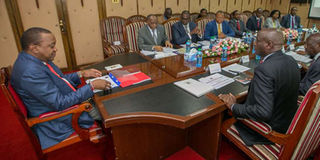Kenya should look to Belgium for how to cope with political crisis

President Uhuru Kenyatta attends a meeting on the status of infrastructure projects in the energy sector, at Harambee House on November 10, 2017. The opposition has stepped up its challenge to Mr Kenyatta’s legitimacy through people’s assemblies. PHOTO | SAMUEL MIRING'U | PSCU
What you need to know:
- The standoff involving opposition derailing parliamentary business is likely to hurt government budgets.
- County governments are struggling to run their operations due to delays by the Treasury to release devolved funds.
Crisis? What crisis?
The vanity of power means there are folks around who are still in denial about the political crisis in Kenya.
Sirikali iko imara (there is stability), they are wont to say.
But a contested repeat presidential election on October 26 has ensured that Uhuru Kenyatta won’t be sworn into office for a second term for at least another two weeks, even if the Supreme Court upholds his victory this time around.
BELGIUM
Mr Kenyatta’s temporary incumbency could yet be prolonged further in the event that the judges overturn his victory again.
If the legitimacy issues around the Presidency continue for another one month, parallels will eventually be drawn between the Kenyan crisis and that of a small club of countries with the dubious record of having waited the longest for a government.
Belgium currently holds the record for the longest wait after the European nation in 2011 passed Iraq’s 249 days without a government.
Belgium’s case should especially interest Kenyans because the political troubles in both countries are largely fuelled by elites exploiting deep ethnic divisions to push their power agenda.
CABINET
The political grievances in the European nation tend to boil over along a North-South divide between Dutch speakers and French speakers.
A caretaker government ran the country during the 353 days its political parties were unable to hammer out a coalition deal.
The Kenyan opposition has proposed a similar government in its agitation for electoral forms.
In Kenya, the Cabinet isn’t dissolved until a new President is sworn into office, so technically there is a government in place.
But the standoff involving opposition derailing parliamentary business is likely to hurt government budgets and weaken its ability to deliver public services.
COUNTIES
Already the county governments are struggling to run their operations and pay their employees due to delays by the Treasury to release devolved funds, partly due to the slowed activity in the Senate and National Assembly.
With Kenya increasingly looking like it is in it for the long haul (the opposition has stepped up its challenge to Mr Kenyatta’s legitimacy through people’s assemblies), it needs to think how to cushion public services from the political crisis and fast.
And it needs to look no farther than Belgium for a solution.
SERVICES
A remarkable feature of the Belgian lengthy stalemate was that it didn’t derail services to citizens because many vital government functions were devolved to the regional governments anyway.
March De Vos, a professor at Ghent University, was quoted in a Time article as saying:
“By and large, everything still works. We get paid, buses run, schools are open. We can free ride for a while yet.”
Kenyans can find a similar foil for political crisis in the 47 devolved governments, but half-hearted embrace by the ruling political elite and limited functions are undermining their role.
If Kenyans ever needed a reason to push for stronger devolution, this is it.
[email protected] @otienootieno




